100 books to change my life forever. That was the milestone. I wanted to make it in one year, but ended up doing it in half the time.
Do you want to know how I read so fast and the impact it has had in my life? Keep reading. 👇👇
Contents
Why start this challenge?
I’m on a personal journey to transform the world as we know it by creating exponential growth.
And crossing this road requires humbleness. Humbleness to acknowledge you don’t know what you don’t know.
Let me show you a new way of thinking. You can see it as a new pair of glasses – for free:
Imagine the world is empty and white. There is nothing at all. Not even a tiny sound.
Now, visualise your city. This is what you know that you know. You start here.
Then, think about our galaxy, the Milky Way. This is what you know that you don’t know. You’ll experience growth by going there.
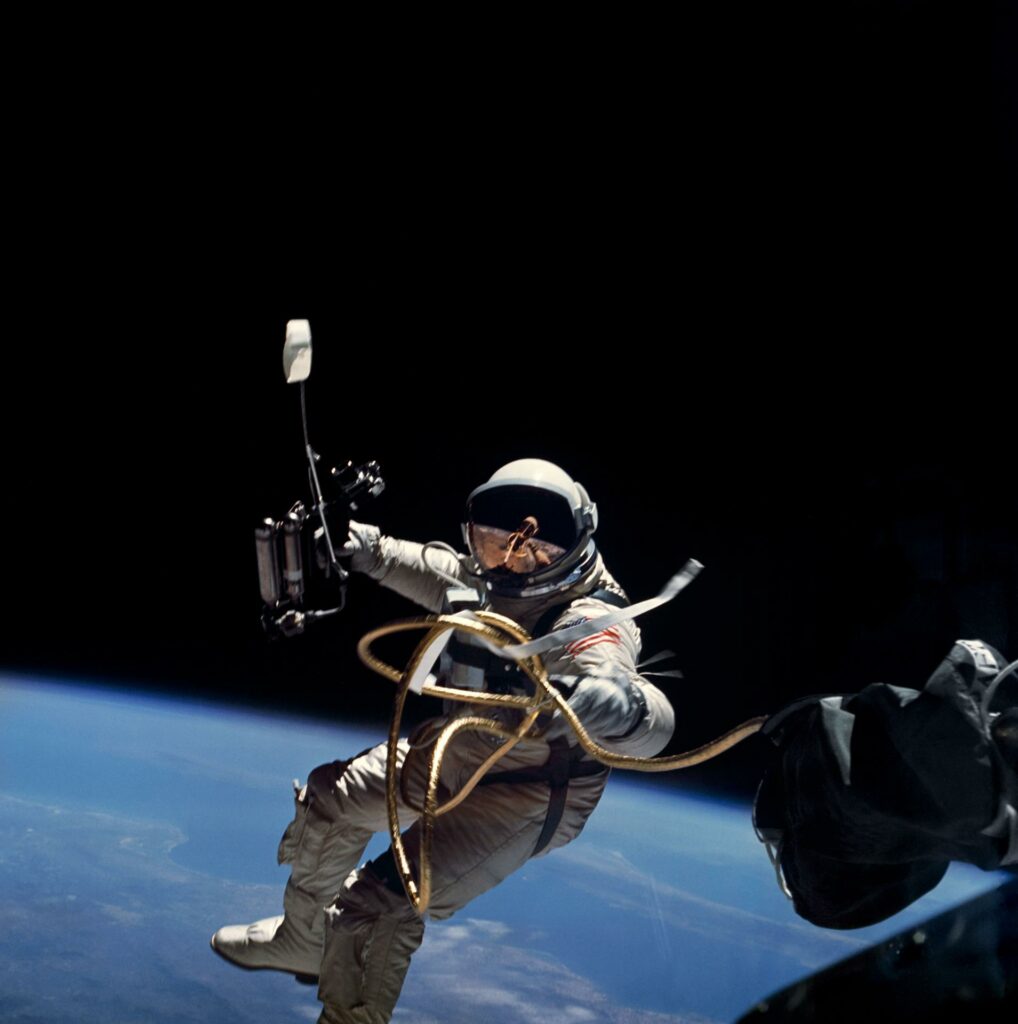
Time to perceive the cosmos. This is what you don’t know that you don’t know. Exactly, you have no idea beyond some machine-generated NASA’s photos (you couldn’t see so many colours) and to-be-debunked Neolithic scientific theories. This is the Big Bang for your life.
(And well guessed: I love astronomy).
That’s why you need to question literally everything, run your life as a series of experiments and get closer to the right people to accelerate your learning. You need to look for the unexpected.
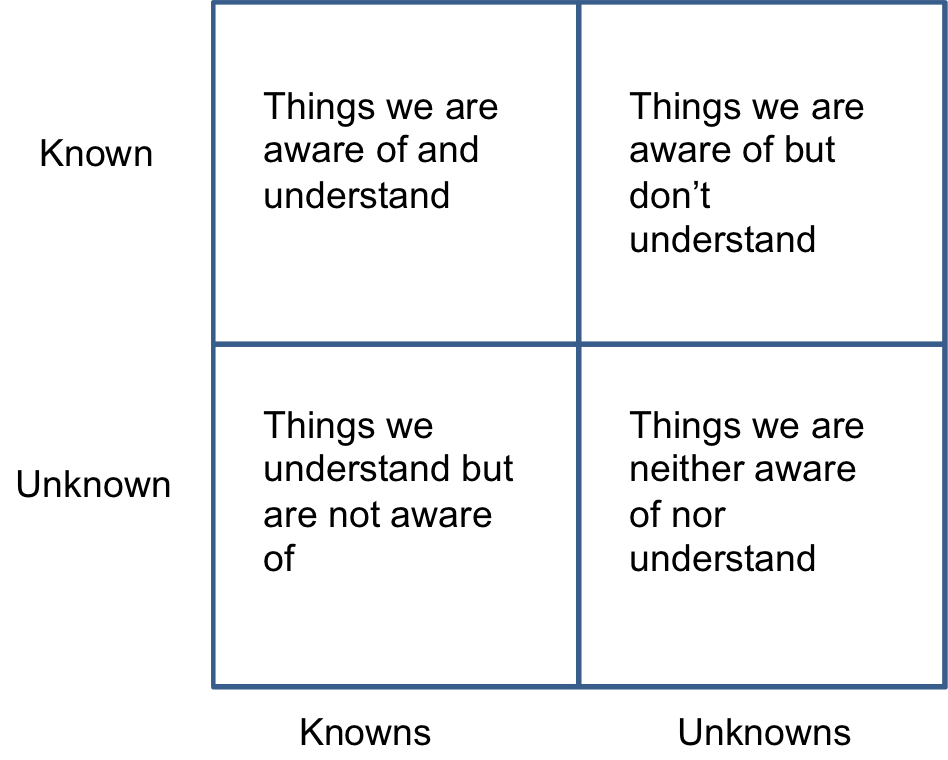
The “You don’t know what you don’t know” statement was born in my mind a few years ago thanks to Freddy Vega at Platzi (I haven’t found the exact video, but this one is similar). Recently I’ve discovered the perspective comes from the US Secretary of Defense Donald Rumsfeld in 2002.
In summary, get out of the bed and find ways to challenge ALL what you believe, ALL who you are. DECONSTRUCT yourself today.
“If you’re not embarrassed by who you were 12 months ago, you didn’t learn enough.”
— Alain de Botton
The “100 books in one year” challenge was born when I realised I knew too few about sales to excel as a growth director. Then I read 3 books on modern sales and was WOWed. Also, I needed to keep perfecting some other skills.
Seriously, how was I able to miss all of that? I had to accept my ignorance and do something about it. Urgently.
I started with 3 books and continued until the robust number of 100. My plan was to do that in one year, but finished the challenge in half the time.
I regret nothing and got the first business benefits just 2 months after I started.
It takes too much time – Revisited myth
“I guess you had no job”, some people told me. Although the fact is I had fewer available time than most people I know.
As a growth director in a startup, I had a more-than-a-full-time job:
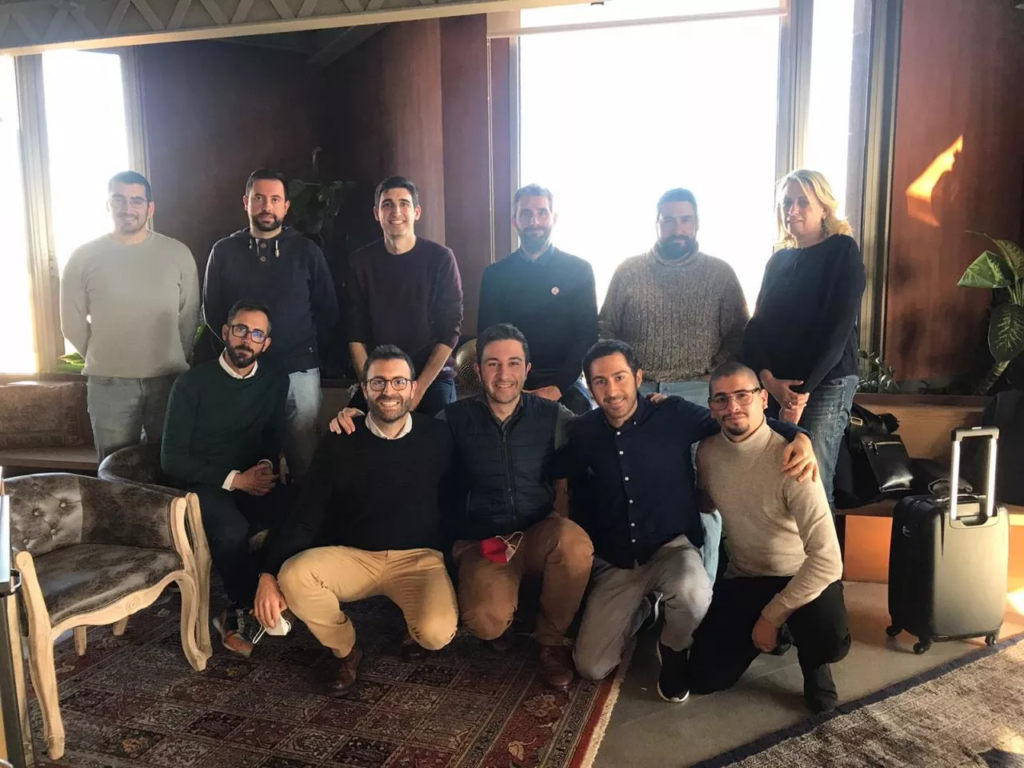
I had a girlfriend for most part of the challenge (sorry, guys, not every story has a happy ending):
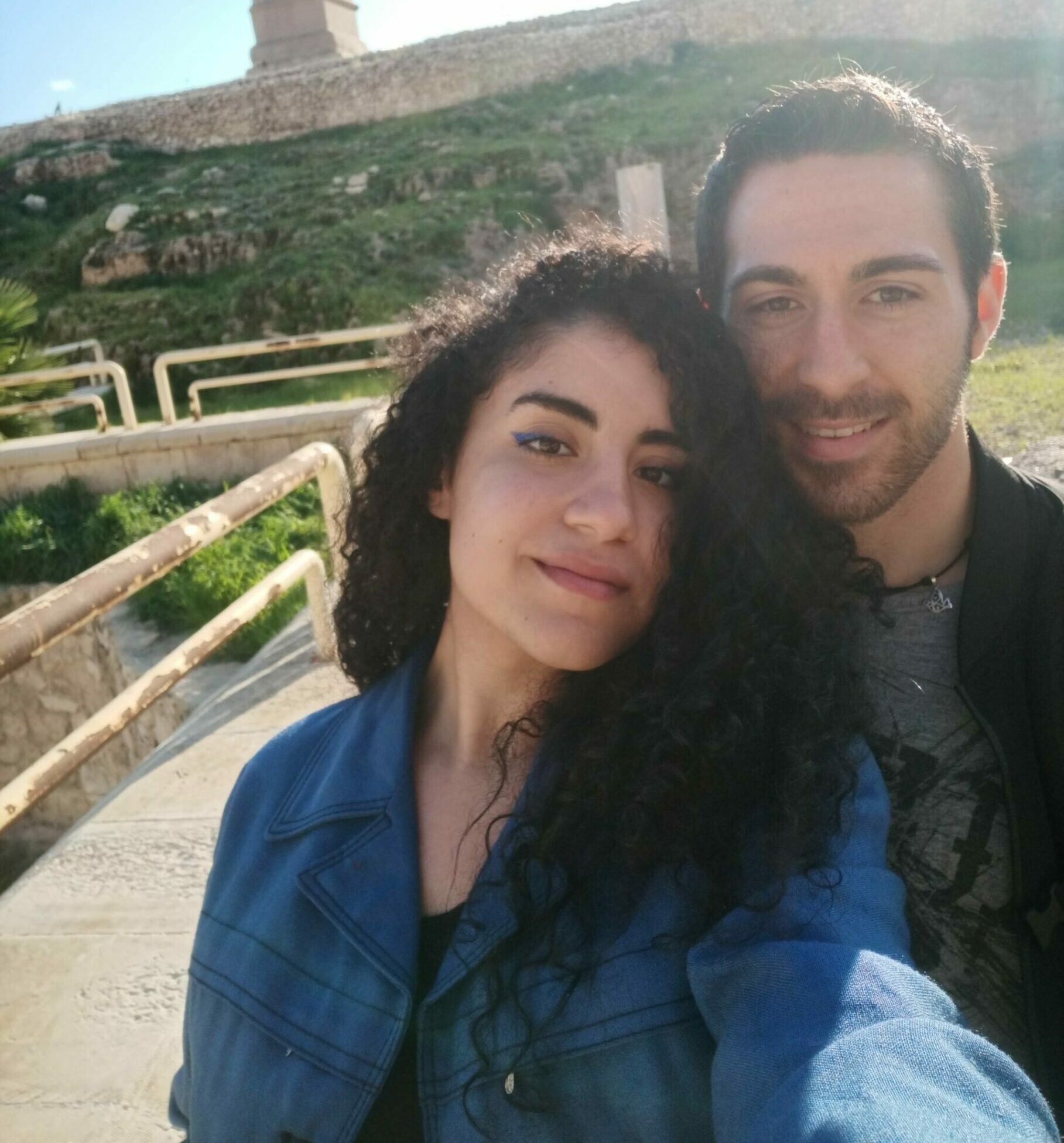
I was roaming the world (please, don’t call me digital nomad, but borderless vagabond):
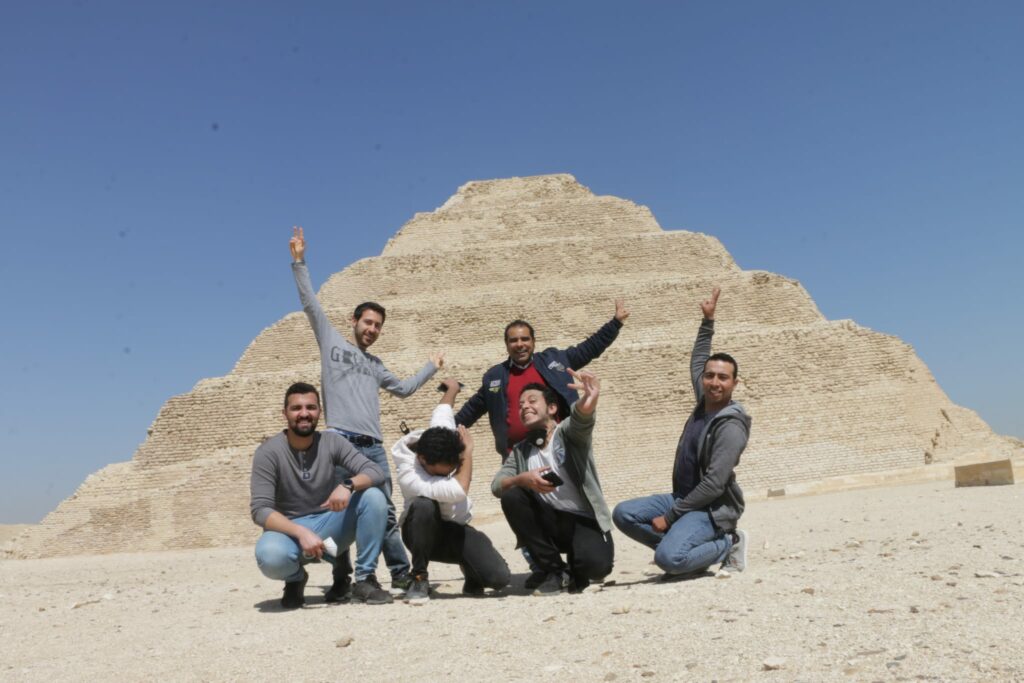
I went to the gym almost every day to reshape my body and got to low 8.8% body fat:
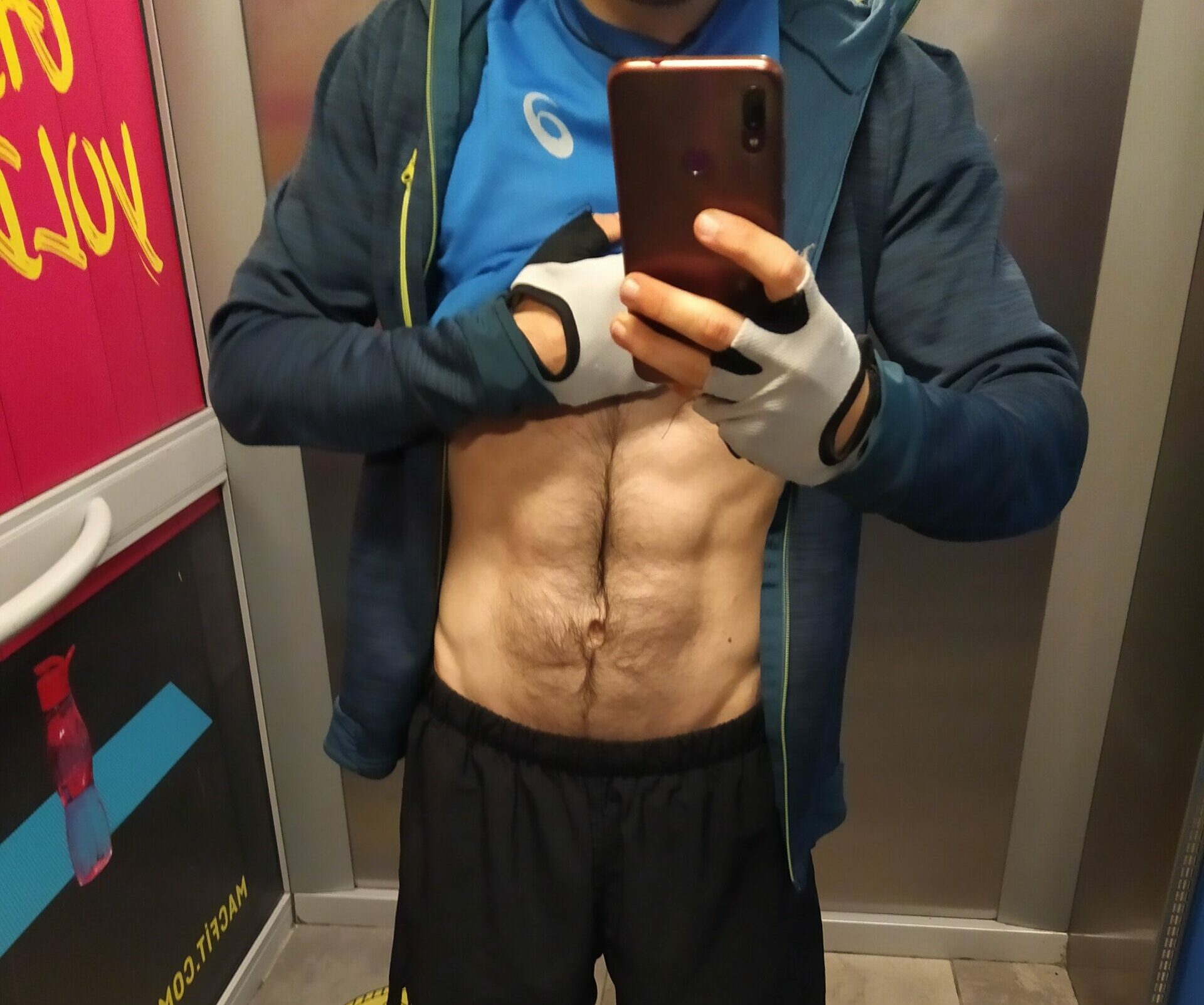
You’re a weirdo, a friend once told me because I bring my laptop or ebook reader everywhere.
If I have to spend 15 minutes in a metro, you find me reading counter-intuitive research in a Kindle. If spending 50 minutes in a train, you’d see me working on some amazing project. Sometimes I just bring my Moleskine (best notebook ever) to take notes while reflecting on my ideas.
I squeeze every second – because I have a strong sense of purpose.
There is time. A day has 24 hours. If you really want something, you’ll find a way to get it. You just need to ask yourself if you have both ambition and passion.
Make time – because you can.
You’ll have to get rid of some activities, though. A colleague told me some time ago: You have time for X, but it’s not your priority. And let’s be honest: he was 100% right.
In my case, I didn’t go out as much as before, specially on weekends, and particularly in the last 3 months. But if you find your purpose, you’ll create compound interest for your life on this challenge.
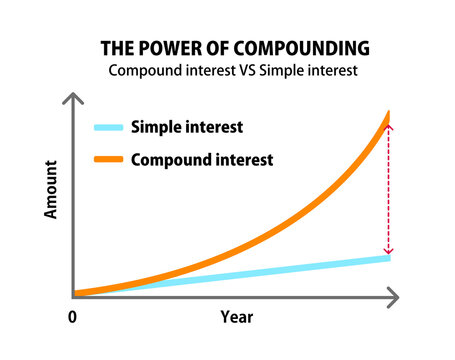
Make time – because you should control your own life.
Isn’t it better to read less? Quantity vs quality
Short answer: no.
Long answer: it depends.
A few books into my challenge, I did some googling on how to read faster to optimise my time. The result?
Disappointment.
I mostly found hacks that made me think of reading like it was fast food. However, if you are what you eat… do you want to be a €1 McDonald’s burger?
I hope you don’t. Better to be a real Turkish kebab, for example.
The issue is… quantity matters. When they say size doesn’t matter, that’ a lie. What they really mean is it’s not everything, but a very important factor. Let me tell you story:
At the University of Florida, professor Jerry Uelsmann divided his photography class into two groups for an experimental assignment. Everyone on the left side of the classroom was in the “quantity” group and they had to shoot very frequently, taking as much as 100 photos per day. On the right side, there was the “quality” group, and their task was to capture only the best photos they could, with just 1 a day.
What group do you think submitted the best photos, the ones focused on volume or on quality?
*drum roll*
The quantity group got the best quality pictures.
I read this experiment in book Atomic Habits by James Clear (you can see a story extract here). And I must agree with the findings, because I get to the same conclusion in my life:
🟢 To get fluent in a language, practice it as much as possible.
🟢 There is a high correlation between a salesperson’s activity (e.g. calls) and their results.
Volume is not everything, but it’s key.
You should set the bar high, but not too high you need to be already a giant to get there.
My recommendation for you is to forget the misleading hacks. Strategy is more important.
Growth design is a new way of planning. One focused on practice, learning and iteration. One that makes you go forward faster, more confidently and more aware of yourself. It’s the real way to reduce failure and also the master-to-slave ratio on human biology. For example, to improve your long-term memory.
Read about what you’re passionate about, so that you’ll want to read. Focus on a topic you want to implement, so that you’ll remember more.
Don’t be a €1 McDonald’s burger. At the same time, always go for more.
By the way, are you aware of Pareto principle? It states that, for many outcomes, roughly 80% of consequences come from 20% of causes. For example, that about 80% of the revenue in a store are generated by nearly 20% of products. You can apply this to almost anything.
For example, I rated the books I read from 1 to 5. And the result is clear: if I only read 25% of the books, I’d have obtained 75% of the benefits. The only issue is… it’s difficult to know what’ll bring you the best benefit.
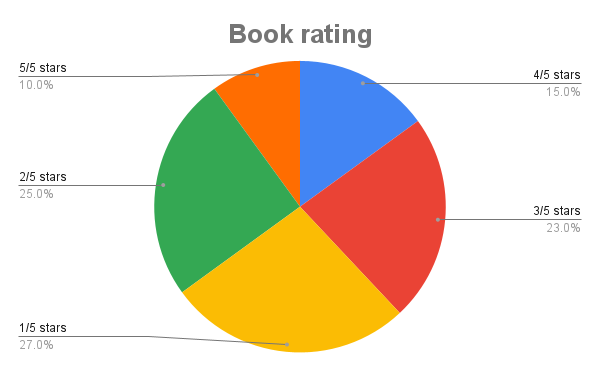
Let’s address the painful question straightforwardly: how many books were worth reading? From the statistics, less than half (48%). However, I truly believe the rest of the readings also contributed to my growth, because I was exposed to more ideas, writing styles and point of views.
The ability to compare is part of what makes you an expert.
How to know what to read?
I don’t like to waste my time. That’s why I make experiments on the ingredients that makes the best recipe for success.
The sources I tested
I explored and tested a large variety of book recommendations, such as:
🤠 Googling best books on {topic}.
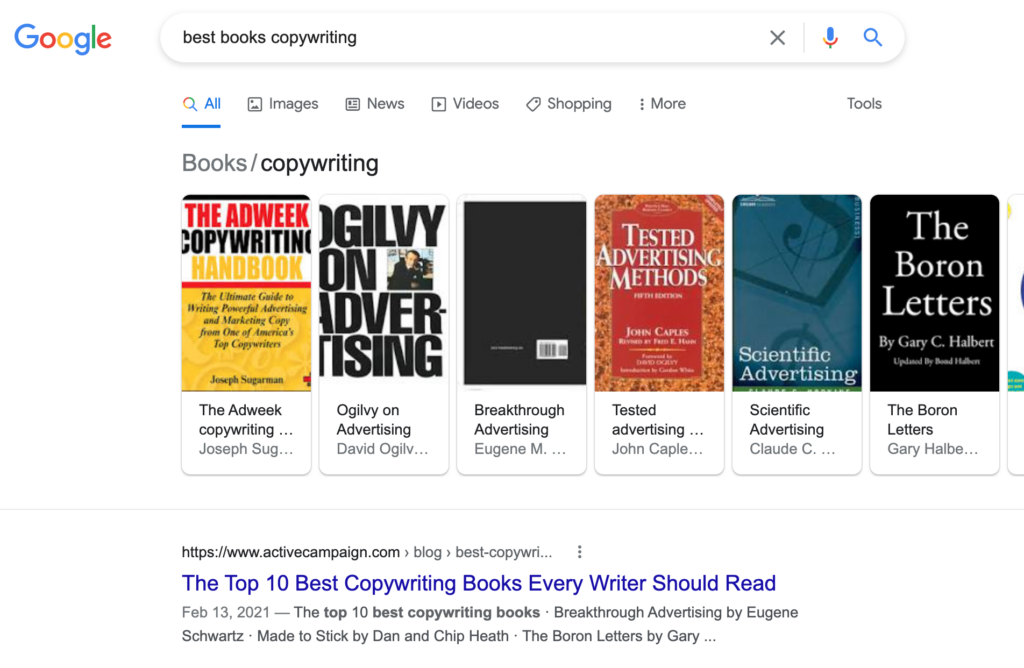
🤠 Amazon’s bestselling book categories, e.g. on marketing.
🤠 Search on Amazon, check reviews (mainly the 4/5 ones) and get a PDF copy to have a better-informed opinion (I don’t like previews).
🤠 Goodreads.com rankings, e.g. non-fiction.
🤠 Asking different kinds of people: consultants I paid, other entrepreneurs, etc.
🤠 Follow people whose experience I value on Linkedin and try their book suggestions.
🤠 Lists of books on reputed blogs, such as HubSpot.
The unexpected result
I was tracking the best book sources for a while based on my after-read rating. This is what I found:
The best source is an authority (someone who knows more than you), which accounted for 28% of the most awesome readings.
When aggregating the data, I find 84% of best readings are social recommendations! From a person or a robot, but suggestions from others after all.
[bctt tweet=”Around 84% of the best content you consume might come from social recommendations”]
This is crazy. I expected others to have a significant impact on my learning, but not so high at all.
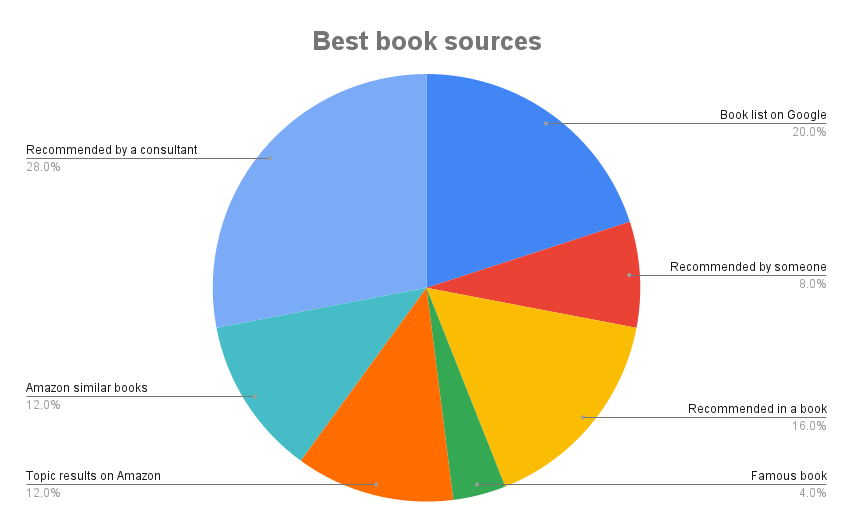
My takeaway is you should definitely go after the “been there, done that” people and ask them for recommendations. I’d even suggest, if you’re into marketing and startups, to create an account on GrowthMentor and ask their confirmed experts.
Yeah, you’ll spend some money, but think of the massive amount of time you’ll save and how faster you’ll grow. Just take the Pareto principle into account. This is a real tactic, and not a fastfood-y hack.
Each cent invested in your education is a cent with a return of investment.
Remark: I’ve read some books that were recommended as a must but I rated them low because they didn’t bring me much, like To sell is human by Daniel H. Pink. It’s all about your starting point.
What were your books about?
You need to know something first:
I strongly believe in what I call “the world’s analogy”.
After studying and practicing dozens of disciplines, from marketing to computer science, I came to realise one thing:
To get better at math, it helps you to study butterflies.
Everything is the same but explained in other words. There is no originality in this world. We just copy and mix, copy and mix.
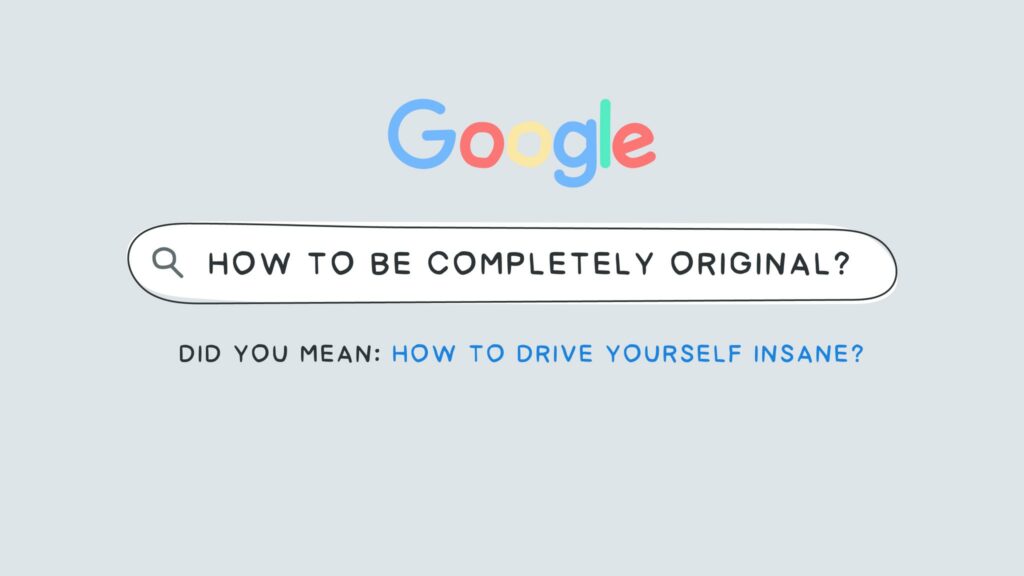
For the 100 book challenge, I focused on topics that improved my core as a Head of Growth. You could expect my answer to be like:
📚 Marketing.
📚 Sales.
📚 Psychology.
📚 Management.
📚 Productivity.
📚 Advertising.
📚 UX/UI.
📚 Copywriting.
📚 Startups.
Plus some others. And yes, I’ve read about this. But…
I’ve also read about history and philosophy, for example, and it definitely made me better as a growth builder. Don’t you see the relationship?
I truly believe watching documentary films on Nazi Germany is more productive than enrolling in most management courses, to give you some hint.
Don’t get me wrong, I’m not saying you should implement their ideas or systems. But I’m not here to repeat to you the same mind-limited and politically correct bullshit that society has heated affix to you as if you were a farm cow.
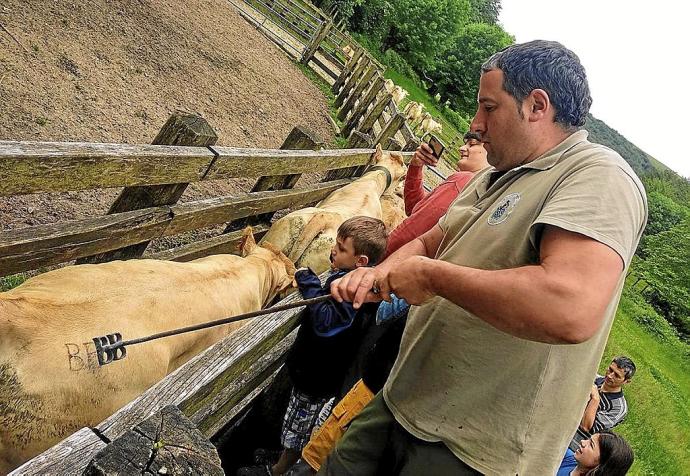
Be innovate. There are already too many sheep.
I have 2 pieces of advice for you:
👉 Focus on implementation
Get your hands dirty from day minus 1. Knowledge for the sake of knowledge is worth nothing. Feeling good or impressing other people with diplomas is overvalued. Don’t suck the masses’ candy.
👉 Focus on different sources
If you read the same than everyone else, you’ll think the same. You should aspire to be different, not just bigger. I’ll tell you for example that acquiring programming skills provided me with more mental clarity and improved my communication ability.
Consider to get exposed to different mental environments and find the transversality. Go from the unknown to the aha moment. That’s why recruiters ask in interviews what your hobbies are or if you have any strange one. Gain awareness on this to exploit your hidden advantages and do what you really love.
The 7 steps to accelerated reading
Read 200 pages per hour: this is one of many sales-y promises you’ll find out there. If someone reads so fast, chances are that person is reading the wrong books. Too easy to be valuable for your life. You should focus on your personal growth, not on impressing other people.
Easy hacks
Hacks on speed reading are like fast food: easy to buy and nice for a while, but not good for anything. They include activities like avoiding re-reading sentences to reflect, so that you go forward faster (danger! you’re limiting your thinking and implementation).
However, here I share with you some tricks that might be helpful in specific situations:
🔴 Go for many books but only read some chapters of each one. You’ll make a better impression e.g. for a homework because you look like you’ve researched a lot more, although you actually understand a lot fewer. It’s mere superficiality.
🔴 Skim or scan the text: look for keywords that you think are more important. You save time by ignoring what you believe is less important.
Tactics you need
Now yes, here you have some useful tactics you need to implement. This is your healthy and tasty food:
🟢 Stop slowly speaking when reading (subvocalising). Gain awareness on the fact you silently pronounce what you read and break the habit. For instance, you can use a pencil or your finger as a guide and move quickly through the text.
🟢 Don’t read the introduction chapter. It doesn’t teach you anything most of the times.
🟢 Control your unconscious associations. For example, if you work from home, read from your desk instead of your bed, so that you won’t feel lazy o tired.
🟢 Actively work on your passive reading. Let me explain: you need to do something else than reading to remember and reflect better. Some people recommend to write a summary after each chapter, but I think it’s not necessary unless you’re one of those guys who talk about books to make a living. I think it’s enough to highlight, make notes and also pauses to analyse how you can implement what you’re reading.
🟢 Avoid unnecessary distractions with environmental planning. For example, silence your phone and leave it some meters away. Also, read in a Kindle, so that you won’t switch task to social chatting.
The 3 disciplines of effective reading
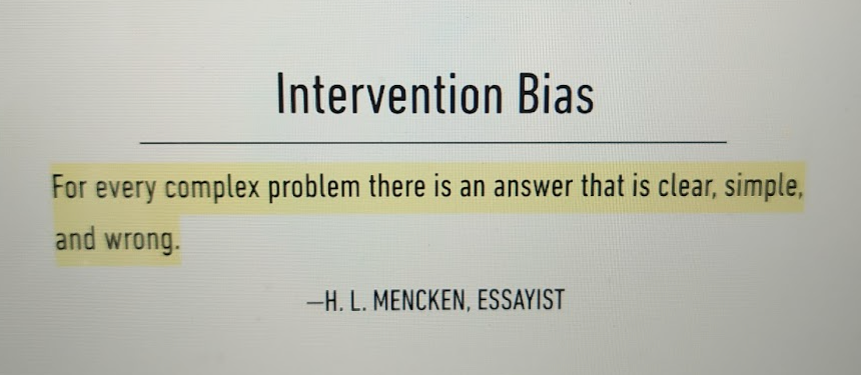
There are 3 cornerstones of effective reading:
💪 To read.
💪 To understand.
💪 To retain.
Whatever you do, keep that in mind. For example, if you read a lot but forget what you read after a few months, I’m not sure you’re getting much benefit from your effort.
The more you read, the faster you read. The more you learn about a topic, the more you understand. And the more you can implement short-term what you read, the more you’ll remember.
There are also other variables, like language mastery. I had already read a significant amount of books in English (my 5th language) by the time the challenge started. However, after reading 97 books in English, I’m pretty sure I read in it faster now.
Remark: although a different topic, a small piece of advice if you’re interested in reading faster in a foreign language is to focus on understanding the text as a whole and not trying to understand every word.
How to read faster: strategic reading
I wanted to learn a lot, mainly what I don’t know that I don’t know, so I thought about setting a target of 100 books. And I wanted to make it happen, so I decided about a one year timeframe.
The issue was that to consume 100 books in one year was quite a big challenge, so I needed to break it into smaller pieces to make it more manageable, and therefore achievable.
You’ll find my new approaches below:
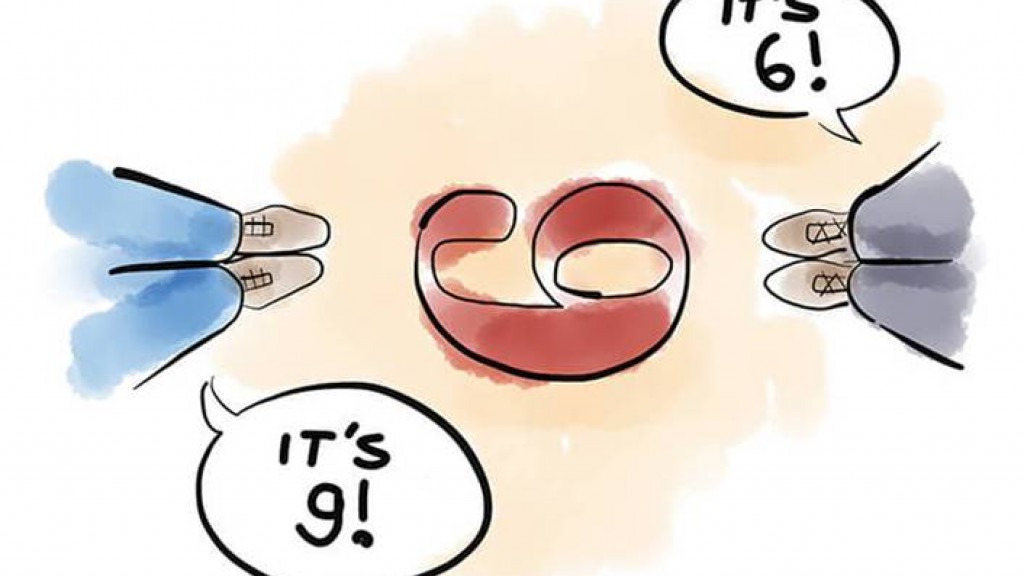
I wouldn’t read 100 books
Human’s primitive brain works more easily short-term, but one year was too long and 100 books meant nothing for my daily life.
I asked myself how much I should read every month, every week, every day, comparing books and pages. After some calibration, I came up with the following idea:
📚 How many weeks a year: 365/7 = 52.14 → 52 (marginally reduce the time).
📚 How many books a week: 100/52 = 1.92 → 2 (marginally increase the objective).
So I set the goal of reading 100 in a year but I’d run for the objective of 2 per week. It made the challenge more tangible and meaningful.
This is the same technique I use with the salespeople I manage at work to make them more accountable and motivated: translate quarterly or even monthly goals to weekly and daily objectives. For example, to make at least 40 calls a day and arrange at least 5 appointments a week.
It wouldn’t take 1 year
I also give real-time access to statistics that show my salespeople their activity volume and accomplishments. This is for a reason: you can’t improve what you don’t measure, and you need a system to measure well.
In other words: you need take control over your challenge, and I didn’t have that.
After some time, I started to doubt how many I had already read. So I decided to start self-tracking my progress in a spreadsheet given a baseline of 2 books a week, and then compare with the real number in a graph.
It felt good to visually see I was consistently winning over my ghost competitor: the bottom line of 2 books a week.
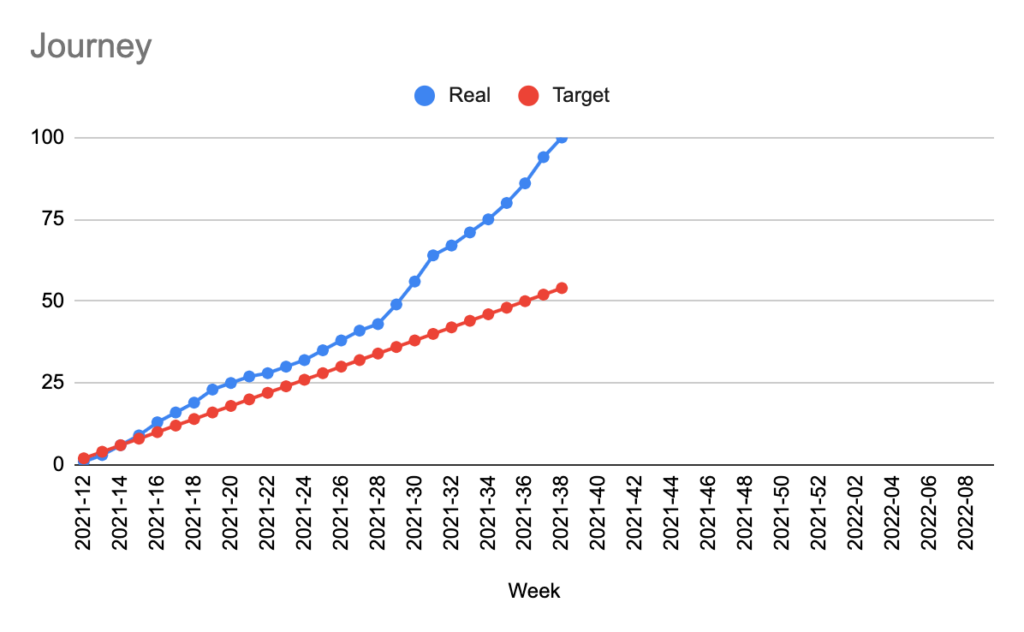
I also set a formula to sum up the total number of read books. This is because there was a lot of time left, and some good vibes were necessary to keep going! Each time that I felt like “uf, still a lot left”, I looked at the “Already read” figure.
But there’s more: when I hire new salespeople, I tell them I don’t expect them to reach the normal level of results in their first week or even month. That takes time. They should do the best they can but not stress. The only important matter for me is to see some sort of progress, even if not reflected on those specific success metrics.
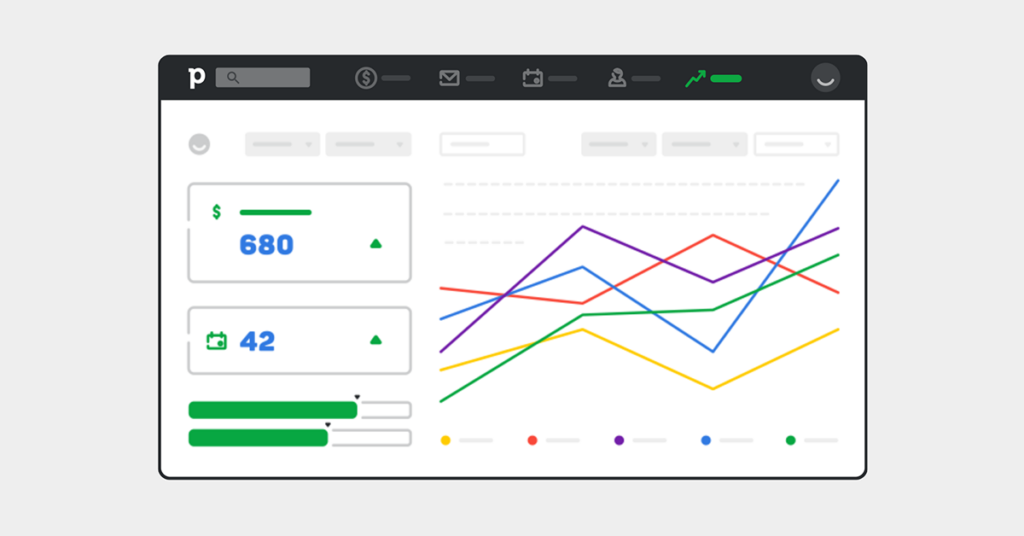
Here’s the trick: because they don’t over-stress, they perform better. And because they can measure their contribution in real time, they strive for me. Also, thanks to an improved toolkit + marketing + sales + training system, even hires with zero experience in sales schedule multiple meetings in their first week.
Boom!
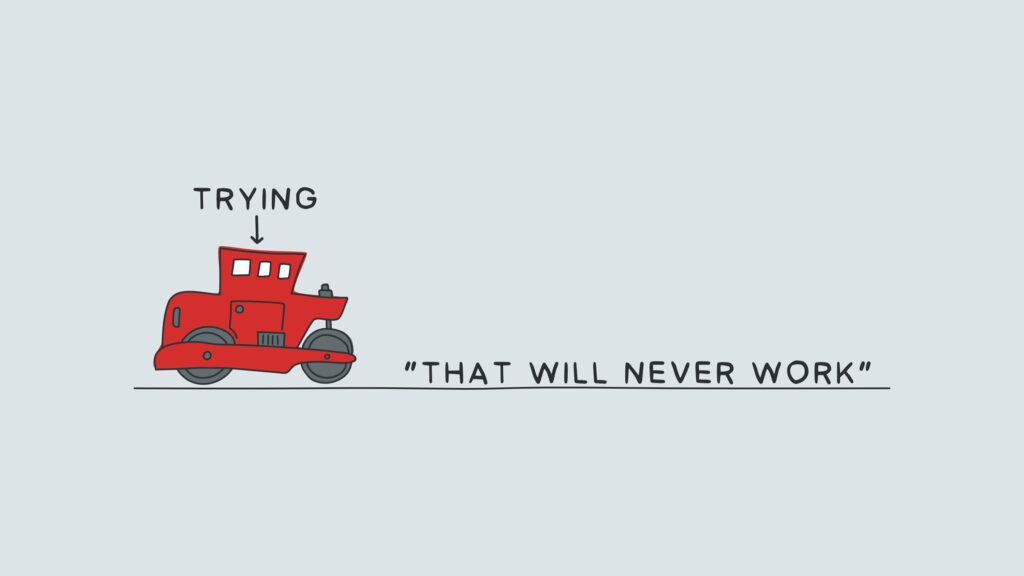
Systems are my North Star. I love to destroy and build them. It’s like when I was a kid and I liked to disassemble all sorts of devices and toys to see how they work inside, and then built something new.
Confession: I made a disaster most of the times (sorry, grandma! LOL).
Back to the challenge, I decided to implement an extra-effort device into my reading system to motivate myself to push harder. This is how it worked: because my reading was self-tracked in a spreadsheet, I could set up a formula showing how many weeks of my life were saved thanks to a more agile progress towards my goal.
![]()
The final result: the challenge was done 23 weeks earlier than expected.
Remark: when I had already too many months left, I used Months left as a metric instead of Weeks left. Perspective matters for engineered motivation.
I’d follow my own rhythm
We have a beautiful saying in Catalan: tota pedra fa paret (literally Each stone makes the wall), which basically means every small bit counts.
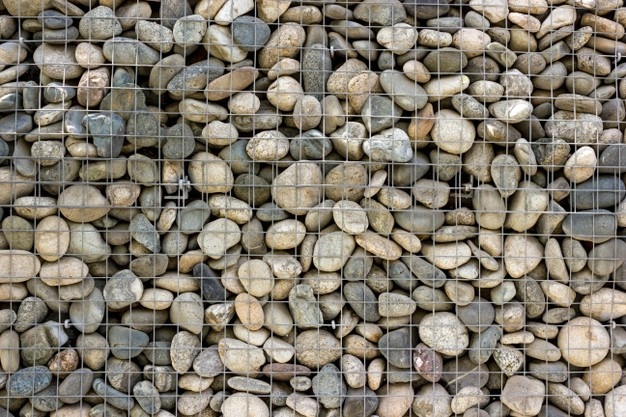
If you’ve ever gone to the gym, you might know how easy it’s to fail. You wake up and come up with any silly excuse to not going one day, then another day, then another one. And when you realise, you’re eating an ice cream box and failed for another week.
Although this is a situation I’ve never experienced with my gym routine, of course there are days I feel like I don’t want to go at all. But I force myself to go even if for 15 minutes. And just the fact I start makes me do more than I expected when I had opened my eyes.
You’re very strict with yourself, said my dietician the last time I visited her. However, the results speak for themselves. And I believe in results.
What I want to say is… try to read a bit every day.
I didn’t track pages or minutes, simply found small chunks of time to read multiple times a day.
You shouldn’t micro-manage yourself. I find objectives like reading 20 pages per day or 1 book every three days quite dumb. Just focus on 2 books per week. And if you find a very interesting one that makes you think, no worries if you spend 2 weeks on it.
Remember why you started the challenge in the first place, and focus on the long term. Apply this to any area of your life that matters to you.
I’d get instant success
I wouldn’t wait for either 1 year or 1 week. I wanted instant gratification and as frequently as possible to stay consistent with a rutine. That’s why I needed to create a stronger association between reading and happiness.
My solution was a logical move:
When I moved from social movements to the startup sector, I learned about powerful work methodologies and how to implement them the right way. One of the fundamentals is a system called Kanban, invented in Japan. In its most basic modern form, it’s a way to visually see how something gets started and finished.
I decided to build an easy table on Notion, and get my instant gratification by moving my books across the willread-reading-read columns.

I wouldn’t do this alone
People are important.
When you learn a language with a friend, chances are you’ll get further and faster. The same applies to the 100 book challenge.
But I wasn’t interested in awaiting anyone to follow my path, so this is how I involved other people into my challenge:
I sent my progress graph to friends and family on WhatsApp as a celebration from time to time. Even sometimes on my Instagram stories, mainly in the beginning. This served to get some praise, useful recommendations and mainly to engage in public commitment. And people might not care, but I do, because my word means something to me.
By the way, it’s researched that if you write what you want, you’re more likely to get it.
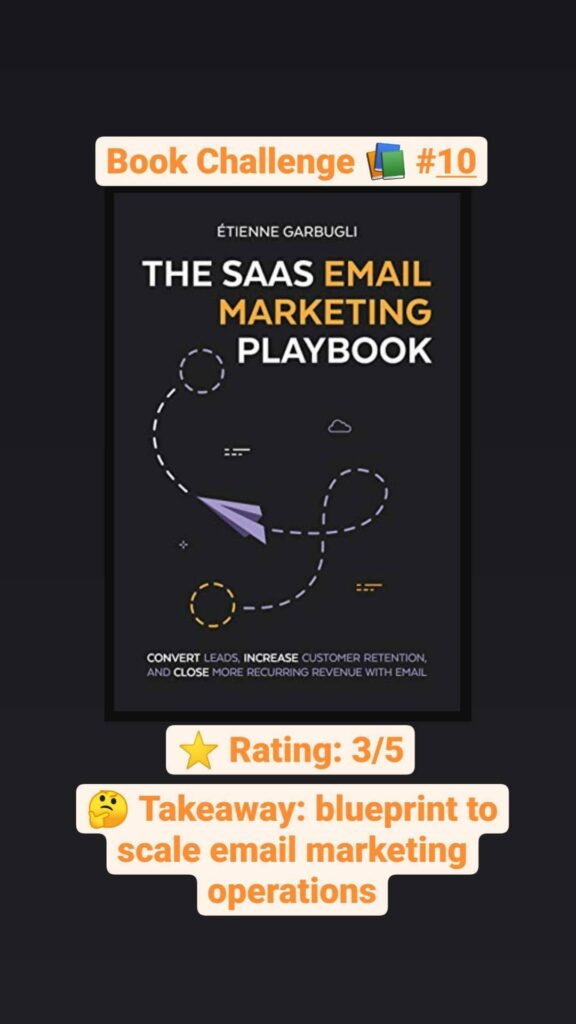
In summary: public commitment + share you progress in public.
My favourite books for you
Many people ask me what my favourite ones were. Find some of my best rated readings and why I recommend them below:
📚 Building a StoryBrand: Clarify Your Message So Customers Will Listen.
Few times in my life I have encountered a book that changed my mind and armed me with ready-to-implement tools at the same time. You can even use them to improve on flirting! Definitely a mandatory book for anyone who takes marketing, sales, advertising or branding seriously.
📚 The Sales Acceleration Formula: Using Data, Technology, and Inbound Selling to go from $0 to $100 Million.
This piece of content is extraordinary. It’s like your best friend was the president of the United States and you had access to the country secrets with no filters. Okay, it’s that but for anyone who wants to build a sales machine.
📚 Dotcom Secrets: The Underground Playbook for Growing Your Company Online with Sales Funnels.
If you believe you know enough about marketing, please take a look at this gem. You’ll realise you knew nothing. After this one, I read all books from Russell Brunson.
What I discovered after reading 100 books
Here you have some of my conclusions:
🚀 Reading 100 books was like learning to sum 2+2 as a kid. Now, I truly believe I could read a minimum of 500 books a year if I had no job.
🚀 New is not better. Breakthrough Advertising was published in 1966, and one might think advertising has evolved a lot, so that reading a book written over 50 years ago wouldn’t be a productive task. But many of my favourite books turned out to be written long ago.
Some of those is what I consider foundational books, because a lot of what we do or think today is based on those texts. Close to the concept of a bible in societal terms.
I even read books such as On the origin of species by Darwin, and oh man… I almost stopped to believe in human evolution. That book was crap, full of “I think” statements and lacked a lot of directly provable evidence. It contained a lot of “I have seen this, I have tried this” statements. It almost felt like a Marco Polo trip, not science.
🚀 Nearly every successful book is a lie, sometimes small, other times a big one. People invent frameworks that simplify reality and make it feel easier, simpler. They sell very well, but many schemes are brought to ridiculous extremes. It’s just people aren’t aware of it.
🚀 Sales was an interesting playground to test my ability to go from nearly zero experience to building a successful system, hire the right people and get tangible results in record time.
🚀 I learned what makes a book really great: the way of writing, the structure, what keeps readers engaged, the importance of stories and how to create them, etc. Also, how some people build their business around books and how I could do the same profitably. The challenge made me a better reader and writer, and that’s awesome because writing skills are undoubtedly important for a marketer like me.
What is your book #1? Share it in the comments! 👇👇
What’s next?
I’m going to keep writing about future and past challenges. Stay tuned by subscribing to my newsletter and following me on social networks!
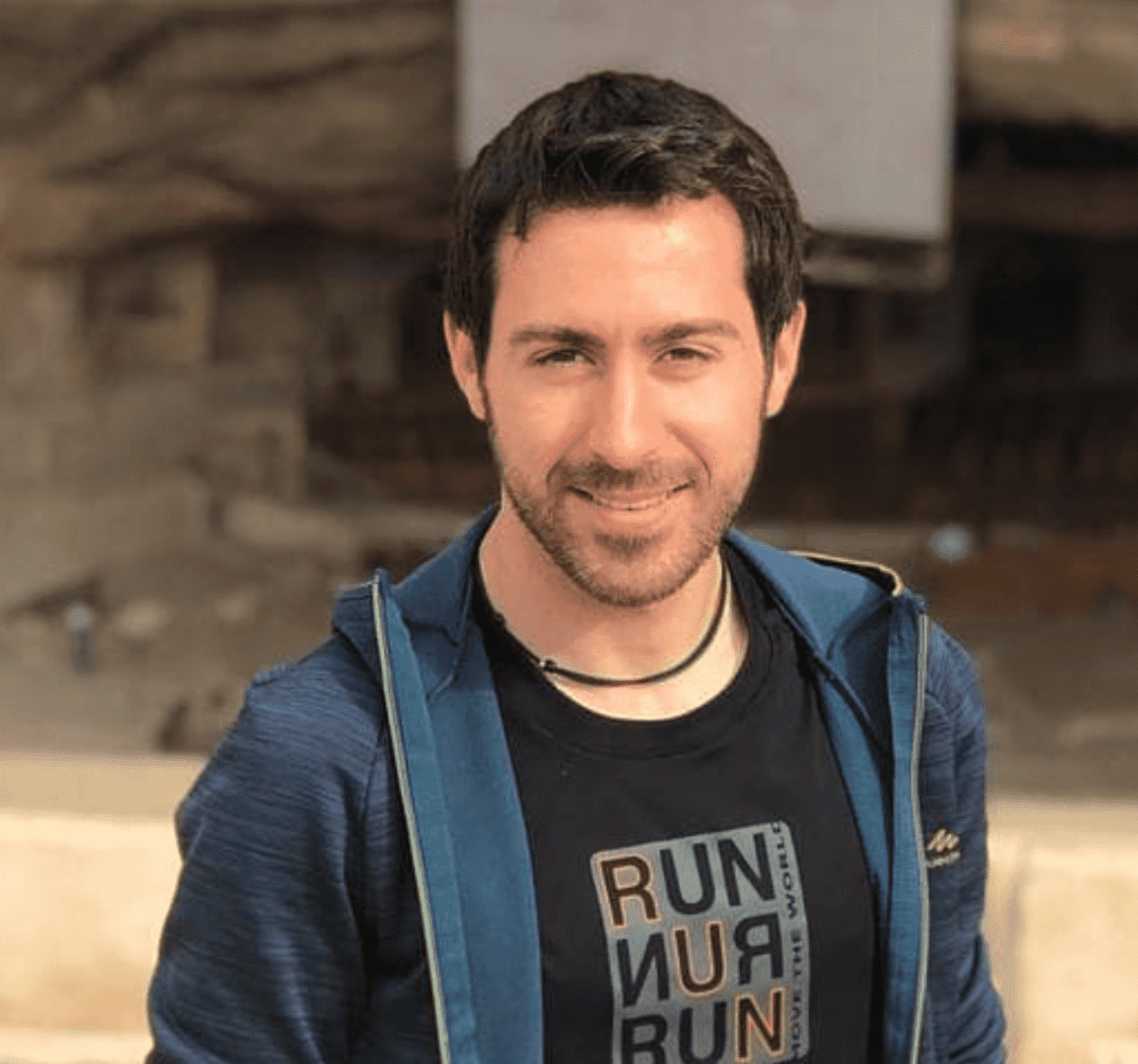
Reality builder, marketing passionate and entrepreneur.

Be First to Comment